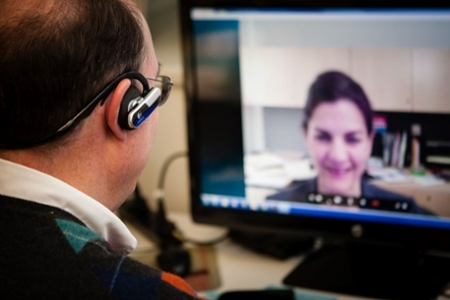Voices of U of U Health
Leader Profile: Rachel Weir Oversees Mental Health Integration
For too long, psychiatry and mental health care have existed off in a corner within the medical landscape. University of Utah Health is moving the needle and helping to change that. Along with establishing the Huntsman Mental Health Institute (HMHI), there are several system-wide mental health initiatives and a new administrative post created for connecting those initiatives with the work being done at HMHI. I’m honored to accept the position as the first Chief of Mental Health Integration.

Patients with mental health conditions often present first to primary care, emergency departments, or even specialty medical care. Our health system recognized the need to have mental health treatment integrated into medical care, employing social workers to help intervene early and treat patients in primary care settings. We have since developed a number of mental health services in primary care, including targeted psychiatric consultations. The main objective of mental health integration is to add mental health services into primary care so patients can receive diagnoses and treatment without delay, as well as providing support for busy primary care providers. By utilizing some of these integrated services, we have the opportunity to prevent newly identified mental health problems from worsening and free up specialty mental health appointments for patients with more complex or more severe problems.
System-Wide Initiatives
Several years ago, U of U Health started screening all patients in outpatient care for depression. This led to a large number of patients who have had positive depression screens, but uncertainty about how to approach this issue. The wait times for mental health providers can be long, and many patients will not follow through with a referral, even when treatment is accessible. This provides an opportunity for us to intervene through innovative programs and approaches.
In the primary care setting, we have started the Collaborative Care model (CoCM) to provide nearly immediate access to care for treatment of depression. CoCM has the strongest evidence base for treating patients with depression in an integrated care setting. It involves the use of a registry to track patients to ensure no one falls through the cracks, stresses the importance of measuring and acting upon illness severity, and takes a team-based care approach that consistently outperforms usual care.
Another program, which originated system-wide, is the Zero Suicide initiative. This initiative provides a framework for implementing suicide safe care and creating a culture empowering people to address the complex issues around suicide more confidently. Utah has one of the highest rates of suicide in the nation, and our health care system’s commitment to Zero Suicide demonstrates our willingness to tackle this challenging problem.
Other Priorities
Ideally, within a health system, patients would be able to access the right type of mental health care for their problem and move across the different levels of care fluidly. We tend to focus on the problem of limited access, but there is also potential for excessive or inappropriate care as well. In order to implement a patient-centric model, when there has been significant improvement in our patients’ mental health, this might involve stepping down to a lower level of care— and, for our patients who have not improved or have worsened, stepping up to a higher level. In order to do this effectively, we need to consistently measure how our patients are doing, follow through on the results, and offer a more complete set of treatment options, from self-help strategies for patients who are at risk of developing mental health conditions to intensive wraparound services, including community connections for patients with severe problems.
We are poised to make so many more advancements in this vital area of human health. It is thrilling our organization is willing to invest in mental health care, and this new area of focus says a lot about our commitment to patient-centric innovation at University of Utah Health.

